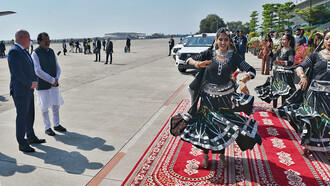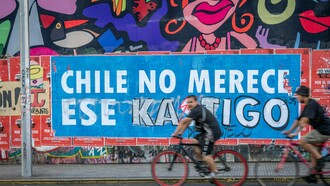Nigeria is currently facing significant economic challenges, which have been worsened by inflation that reached 34 percent by December 2024. This alarming rate has pushed millions of families into poverty. It is important to note that Nigeria has not experienced such high inflation in the last three decades. Part of this inflationary trend can be attributed to the devaluation of the nation's currency, the Naira, which has lost approximately 45 percent of its value in the past year.
The consequences of these negative developments have led to a rise in child poverty, increased street begging, and the use of underage children for labor, particularly in Northern Nigeria.
The Northern region has been hardest hit by the issue of out-of-school children, many of whom are seen begging on the streets in various cities. In areas such as Kano, Katsina, Sokoto, Kebbi, and Bauchi, underage children can be found moving in groups, begging for food instead of being enrolled in school.
Almajiri as a menace to society
In most cases, the children commonly referred to as “Almajiri” are taken from their villages to the cities under the pretense of receiving quranic education. Unfortunately, these underage children often end up begging on the streets for money and food to survive. The Almajiri system has become a significant challenge to both educational advancement and economic progress in the region.
The term "Almajiri" is derived from the Arabic word “Almuhajirun,” meaning a person who leaves their locality in search of Islamic knowledge. During the colonial era, Quranic schools were supported by the government, local communities, and parents, and also sustained through farming by the teachers and students. In those times, begging, as it is known today, was virtually nonexistent.
Quranic teachers, commonly referred to as Malams, along with their pupils, provided the community with Quranic education, teaching, reading, and writing of the Quran. Additionally, they contributed to the development of Ajami, a system of writing and reading the Hausa language using Arabic alphabets. This educational framework, based on the teachings of the Quran, equipped Northern Nigeria with knowledge about governance, customs, traditional crafts, trade, and even modes of dressing.
However, in recent decades, the system has been corrupted, with Quranic teachers sending children to beg for food on the streets. Furthermore, many irresponsible parents have abandoned their duty to care for their children, sending them away to cities under the guise of acquiring Quranic education.
Education key to development of Northern Nigeria
In the past two decades, the Northern region has seen a significant increase in the establishment of primary and secondary schools that incorporate both Western and Islamic education into their curricula. Many parents who wish for their children to learn Quranic education now choose these schools over traditional secondary schools. However, despite the growth of institutions that offer Quranic education alongside Western education, the issue of the Almajiri system persists.
The reality is that the current Almajiri system is no longer sustainable and has lost its relevance. The northern region of Nigeria can no longer tolerate the presence of underage children, who should be in school, forced to beg on the streets for survival. The security challenges facing some areas of the region can be linked to the Almajiri system, which has hampered development.
Education is a critical component of the United Nations’ Sustainable Development Goals, and the region cannot afford to jeopardize the future of its children by allowing the Almajiri system to continue unchecked. The future of society looks bleak with a large population of malnourished and unkempt children roaming the streets under the pretense of Islamic education. If these children are left to fend for themselves on the streets, they may ultimately fail to acquire any meaningful skills necessary to become productive members of society.
The need for a reform of the system
It is important to recognize that no society can achieve progress and economic advancement while its human resources are depleted. This situation is exemplified by millions of underage children, dressed in tattered clothes, roaming the streets and begging for food. The governors of the states in Northern Nigeria must awaken from their indifference and take decisive action to address this issue. They should either ban the Almajiri system or reform it to prevent children from begging on the streets under the pretense of Islamic education.
Parents in rural areas should refrain from sending their children to cities and instead allow them to receive Quranic education within their local communities, supervised by qualified Islamic teachers. It is the government’s responsibility to engage these Quranic teachers and provide them with a stipend. Furthermore, the government should enact legislation to prosecute irresponsible parents who refuse to enroll their children in school and instead rely on the Almajiri system of Quranic education, which endangers their children’s lives as they beg on city streets.
These children who are left by their parents to survive on the streets end up growing up without any skill or vocation and end up becoming a burden to the society. In some cases, they end up engaging in crime and social vices thereby endangering the peace and stability of the communities they live in.















